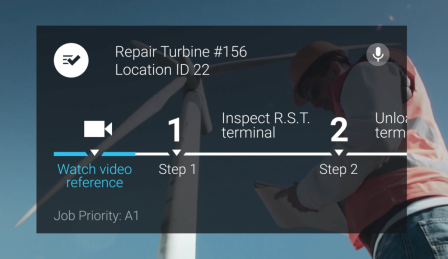APX Labs’ Skylight glasses see a safer, more efficent workplace

APX Labs, a growing enterprise startup, was awarded the Technology Pioneer award by World Economic Forum for its Skylight wearable platform on Monday.
The Skylight platform provides a smart glasses overlay for industrial workers that lets them see tasks, watch how-to videos, communicate with management, and stream POV video.
See Also: Alphabet spells future W-E-A-R-A-B-L-E-S
General Electric, Boeing, Tesla, and Shell, some of APX Labs’ biggest customers, use the smart glasses for manufacturing operations that require detailed tutorials or constant oversight from a manager or lead engineer.
APX Labs claims that the smart glasses make workers more productive, reduce errors, and provide better tracking for management. Major manufacturers seem to agree, with over a dozen multi-billion dollar companies listed as customers on APX Labs’ website.
“We see technology like ours that pairs with wearable devices and new and exciting ways of interacting with technology and computers and we see a truly connected workforce that’s flexible. What we’re finding with a lot of our customers is that the automation can’t actually match it when you have human automation equipped with the same powers,” said Jeff Jenkins, the co-founder and CEO of APX Labs.
Jenkins also mentioned the misconception of the ‘Fourth Industrial Revolution’ as the revolution that removes humans from industry. “I think a lot of people kind of look at it with fear. They see automation and robots and technology and taking jobs and replacing the human element. We don’t see it like that at all,” said Jenkins, who believes that the smart glasses will provide companies with more productivity while maintaining their current staff.
Smart glasses have moved beyond Google
Smart glasses made a splash in 2013 with the announcement of Google Glass, but after 12 months were universally trashed by consumers. Google chairman Eric Schmidt said that the a consumer version of Glass was “probably a year-ish away” in mid-2013, but changes in public perception have led to over two years of silence from the Glass, now Aura, team.
Since then, other tech firms like Sony and Microsoft have announced augmented reality headsets, but the former has been focused on enterprise sales (APX Labs uses Sony’s Smart Eyeglasses) and the latter has ambitions for everything, from NASA to Minecraft.
The near future is looking more promising for augmented reality and “smart glasses” than in 2013. Virtual reality headsets are starting to enter the living room, as Oculus, HTC, and Sony start to battle for market control—this will most likely spur on other headsets like Google Glass and Microsoft HoloLens, which offer a more well rounded experience outside of gaming.
The post APX Labs’ Skylight glasses see a safer, more efficent workplace appeared first on ReadWrite.
(54)


